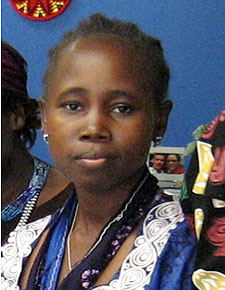 While Australia may be Amou Job's second home, in her heart of hearts it might as well be her first.
While Australia may be Amou Job's second home, in her heart of hearts it might as well be her first.
This was the country that provided her with all the things she could never dream of, growing up in war-torn Sudan " a future and a country her family could safely call "home".
Anglicare is marking International Refugee Week by celebrating the contribution of more than 700,000 refugees and humanitarian migrants like Amou, who over the past 60 years have made Australia their home.
Born into a Christian family Amou grew up knowing and loving God through her grandfather who was a minister in the Anglican Church in Sudan. They were visiting him when the war began and the family started their life on the run.
"I was eight when war broke out in the Sudan and we spent many years moving from village to village," she explained.
Separated from her father during the war, Amou struggled with her mother in southern Sudan to survive. It was a dangerous time Amou recalls. "If you were caught by the rebels you would be killed."
Unable to go to school, Amou came to Australia five years ago illiterate in her own language, let alone English. But she was determined to take up the opportunities this new country offered.
For Amou learning English was a matter of survival. She had children to support and with no relatives or extended family to turn to for help, she had to look to herself.
"I was a single mother who needed to look after a family. Who would be able to help me if I couldn't? I could not rely on Centerlink forever. I had to do it even if it was difficult," she said.
"I also wanted to be able to help my children, not the other way around. At least if I studied, my kids can see me and understand that study was important. I remember telling myself that everyone was free to be educated in this country, so why not me? If other people can do it and they are human beings like me, why can't I do it?"
Introducing Amou to the Parramatta library five years ago was one of the best things her English teachers could have done for her.
"Every day after class I would go to the library with my three-year-old boy and borrow simple English books and cassettes. I would read and read and read and listen to tapes for hours," she said.
It was also in Australia that she began to read and understand the bible for herself. A member of the Western Sydney Alliance Church, Amou says their love and care really helped her to mature in her faith.
"It is a small, lovely church and I was blessed to find it. The people there helped me with practical things as well. The pastor used to come every Saturday to help me practice my driving. It has been wonderful to find a group of Christians who would do things like this because they were Christians," she says.
Five years later, Amou has not only passed all her English courses, but also her Diploma in Community Welfare Work and is working for Anglicare.
Refugee success stories
At least seven per cent of Australians have been a refugee or have a parent or grandparent who has been a refugee. Many have become prominent in Australian business, government, education, the arts, sport and community life.
According to Angelo Cawuop, an Anglicare Sudanese program worker, there is a generation of Sudanese refugees who are now settling well into this country.
"Within three or four years we are seeing people, especially our young people, starting to do well. We have some people who are now in universities in different disciplines. Some have got into law, engineering and courses in community welfare. They are employed and working in banks, migrant services, government departments."
Offering a word of encouragement to many of her countrywomen who may be working hard to settle in Australia, Amou says, "You can do it. We are women. We are human beings and can do what Sudanese men can do. We can be like other people."

























